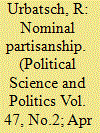|
|
|
Sort Order |
|
|
|
Items / Page
|
|
|
|
|
|
|
| Srl | Item |
| 1 |
ID:
163792


|
|
|
|
|
| Summary/Abstract |
How do people form beliefs about the factual content of major events when established geopolitical orders are violently challenged? Here, we address the tragic events of 2 May 2014, in Odesa, Ukraine. There, Euromaidan protest movement supporters and opponents clashed following Russia’s annexation of Crimea and the onset of the Donbas conflict, culminating in the worst civilian death toll the city had seen since World War II. Shortly after, we surveyed Ukraine’s population about who they thought had actually perpetrated the killings and relate people’s answers to alternative narratives (frames) that an original content analysis finds were available to Ukrainian citizens through different media. We find evidence, consistent with theories of hot cognition and motivated reasoning, that the Odesa violence triggered emotional responses linked to ethnic, regional, and partisan identity, which then activated attitudes associated with these identities that, in turn, led people to adopt very different (sometimes highly improbable) beliefs about who carried out the killings. Ethnic identity in particular is found to have strongly moderated the effects of television, with Ukrainian television greatly influencing Ukrainians but backfiring among Russians, and Russian television mainly impacting non-Ukrainians. Education and local information are found to reduce susceptibility to televised factual narratives.
|
|
|
|
|
|
|
|
|
|
|
|
|
|
|
|
| 2 |
ID:
141640


|
|
|
|
|
| Summary/Abstract |
Party identification is central to the study of American political behavior, yet there remains disagreement over whether it is largely instrumental or expressive in nature. We draw on social identity theory to develop the expressive model and conduct four studies to compare it to an instrumental explanation of campaign involvement. We find strong support for the expressive model: a multi-item partisan identity scale better accounts for campaign activity than a strong stance on subjectively important policy issues, the strength of ideological self-placement, or a measure of ideological identity. A series of experiments underscore the power of partisan identity to generate action-oriented emotions that drive campaign activity. Strongly identified partisans feel angrier than weaker partisans when threatened with electoral loss and more positive when reassured of victory. In contrast, those who hold a strong and ideologically consistent position on issues are no more aroused emotionally than others by party threats or reassurances. In addition, threat and reassurance to the party's status arouse greater anger and enthusiasm among partisans than does a threatened loss or victory on central policy issues. Our findings underscore the power of an expressive partisan identity to drive campaign involvement and generate strong emotional reactions to ongoing campaign events.
|
|
|
|
|
|
|
|
|
|
|
|
|
|
|
|
| 3 |
ID:
131692


|
|
|
| 4 |
ID:
105197


|
|
|
|
|
| Publication |
2010.
|
| Summary/Abstract |
Partisanship is strongly correlated with attitudes and behavior, but it is unclear from this pattern whether partisan identity has a causal effect on political behavior and attitudes. We report the results of a field experiment that investigates the causal effect of party identification. Prior to the February 2008 Connecticut presidential primary, researchers sent a mailing to a random sample of unaffiliated registered voters who, in a pretreatment survey, leaned toward a political party. The mailing informed the subjects that only voters registered with a party were able to participate in the upcoming presidential primary. Subjects were surveyed again in June 2008. Comparing posttreatment survey responses to subjects' baseline survey responses, we find that those reminded of the need to register with a party were more likely to identify with a party and showed stronger partisanship. Further, we find that the treatment group also demonstrated greater concordance than the control group between their pretreatment latent partisanship and their posttreatment reported voting behavior and intentions and evaluations of partisan figures. Thus, our treatment, which appears to have caused a strengthening of partisan identity, also appears to have caused a shift in subjects' candidate preferences and evaluations of salient political figures. This finding is consistent with the claim that partisanship is an active force changing how citizens behave in and perceive the political world.
|
|
|
|
|
|
|
|
|
|
|
|
|
|
|
|
|
|
|
|
|